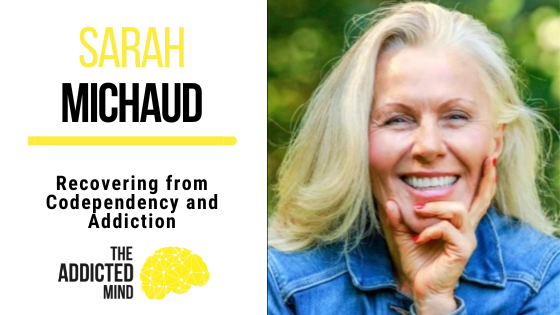On today’s episode of The Addicted Mind Podcast, Duane speaks with Sarah Michaud, clinical psychologist and author of Co-Crazy: One Psychologist’s Recovery from Codependency and Addiction: A Memoir and Roadmap to Freedom.
One of the reasons Sarah published a book on codependency is that after working with patients and clients for the last 30 years, Sarah noticed that a lot of them were recovering addicts and alcoholics.
In her book, Co-Crazy, Sarah shares her own story as well. In 2006, Sarah married a guy, who was 15 years sober, and thought he was the man of her dreams. Unfortunately, he ended up relapsing after getting surgery and getting into the opiates.
The major underlying issue for a lot of recovering addicts is unresolved codependency. Codependent behavior comes out of fear and addiction comes out of fear or unresolved feelings. For an addicted person, there’s all that rationalizing, minimizing, and denial happening. It’s the same process for the codependent as well.
How do you then recover from codependency and addiction? Today, Sarah discusses how focusing on yourself and understanding your own needs and wants first, is the way to find peace and freedom in your life – not sacrificing yourself for someone else’s addiction.
In this episode, you will hear:
- Codependency and addiction
- How codependency becomes progressive
- Focusing on yourself to get better
- The consequences of codependency
- Reconnection to the self
- Confronting the discomfort and being with it
Key Quotes:
[02:47] – “Codependent behavior comes out of fear, and addiction comes out of fear or unresolved feelings.”
[06:17] “Many people who are codependent don’t have an addiction. They’re just preoccupied with their partner’s lives.”
[10:36] “Until I realized that I had to focus on myself to get better, and start figuring out what I needed, I couldn’t change the situation.”
[11:37] “The biggest fear is the person dying… the delusion is that you’re controlling the other person’s behavior.”
[15:17] “The consequence of codependent behavior is that the people around us start to believe they can’t take care of themselves.”
[32:47] “If you can confront the discomfort and be with the discomfort, there might be a spike of intense bodily sensations. But if you set the boundary that is for longer-term comfort, then you’re not going to have to experience it.”
[36:45] “Check in with yourself even if it’s five minutes a day and say, “What do I want? What do I need? What works for me?” because recovery is all about getting more in touch with yourself.”
Subscribe and Review
Have you subscribed to our podcast? We’d love for you to subscribe if you haven’t yet.
We’d love it even more if you could drop a review or 5-star rating over on Apple Podcasts. Simply select “Ratings and Reviews” and “Write a Review” then a quick line with your favorite part of the episode. It only takes a second and it helps spread the word about the podcast.
If you really enjoyed this episode, we’ve created a PDF that has all of the key information for you from the episode. Just fill in your information below to download it.
Supporting Resources:
Co-Crazy: One Psychologist’s Recovery from Codependency and Addiction: A Memoir and Roadmap to Freedom
www.amazon.com/Co-Crazy-Psychologists-Recovery-Codependency-Addiction/dp/1736720430

